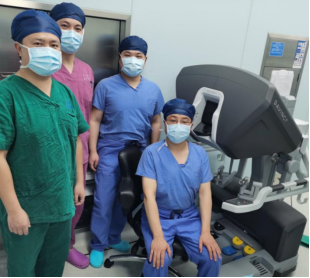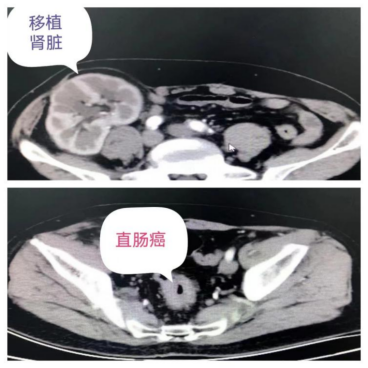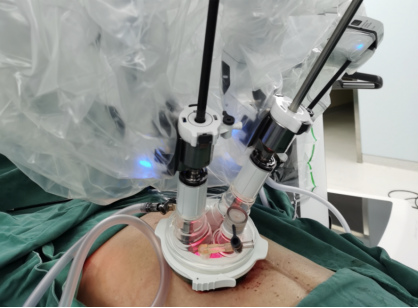- News
The Gastrointestinal Surgery Team Performed A Robotic Single-port Radical Rectal Cancer Surgery to Gave the Patient A Second Life
Link of original article:
https://mp.weixin.qq.com/s/hzrfABxctnenolpeJcThLQ
"20 years ago, I had a kidney transplant here, and it was you who saved my life. I didn't expect that 20 years later, it is still your doctors 'removed' the rectal 'bomb' for me, so that I won't suffer pain..." in the gastrointestinal surgery ward of Shanghai General Hospital, Mr. Xu expressed his gratitude.

Recently, the gastrointestinal surgery team of the General Surgery Center of Shanghai General Hospital, together with the Urology Center, the Department of Anesthesiology and other disciplines, successfully implemented the robotic single port radical rectal resection for a “20 year” kidney transplant recipient who had suffered from rectal cancer nowadays. The renal function of the patient was not affected after the operation, and has now discharged from the hospital.
Mr. Xu, 65 years old, who underwent kidney transplantation in 2003 for end-stage renal disease and renal failure in Urology Department of Shanghai General Hospital . After the transplantation, he took anti-rejection drugs for a long time and had regular post-transplant follow-up health management. A month or so ago, he appeared to have blood in his stool, and he went to the hospital for the first time since the outbreak of the pandemic and was found to have a cauliflower-like mass in the upper rectum by colonoscopy. He was diagnosed to have rectal cancer.
"At that time, I did feel a bit devastated and conflicted." Mr. Xu recalled, "I was worried about not being able to have surgery, but also worried that the safety of the surgery would be affected by taking immunosuppressive drugs for a long time." These issues became a huge burden on his mind. Suddenly, Shanghai General Hospital flashed through his mind. He came to Professor Chen Huang, deputy director of Shanghai General Hospital General Surgery Center and director of Gastrointestinal Surgery (North), for help. After careful inquiry about his condition and a detailed physical examination, Prof. Chen Huang decided to perform a robotic single-port radical rectal cancer surgery for Mr. Xu. "Doing a good radical oncological surgery without affecting the patient's transplanted kidney function, while ensuring the anastomotic blood supply and healing, and allowing the patient to be discharged smoothly and successfully, are my primary considerations as a doctor." Prof. Chen Huang explained. Mr. Xu was no longer worried and decided to do the minimally invasive surgery.

Prof. Chen Huang, Dr. Shijun Xiang (Attending surgeon,General Surgery Center),Dr Yan Qin (Chief physician,the kidney transplantation department of the urology center)Prof. Jinbao Li(Director of the Department of Anesthesiology), and other experts had a thorough preoperative discussion and decided to adopt the minimally invasive scheme of robotic single port rectal cancer surgery, and carefully formulated perioperative treatment measures to accurately regulate anti-rejection drugs. On the day of the operation, with the cooperation of multiple disciplines, Prof. Chen Huang spent an hour and a half to successfully complete the robotic single port radical resection of rectal cancer, lymph node dissection and digestive tract reconstruction through only a small incision around the navel of about 4cm.
Guided by the concept of enhanced recovery after surgery, the surgical team also adopted a multi-mode analgesia scheme for patients, which greatly reduced patients' pain and surgical stress. " Mr. Xu can drink water and get off the bed on the first day after operation, which further prevents venous thrombosis and lung infection of lower limbs, and promotes the recovery of gastrointestinal function and mentality."

"Thank you so much to the gastrointestinal surgery team. Their professionalism and patience have given our patients a full sense of security and trust." Mr. Xu said.
According to reports, after organ transplantation, due to long-term immunosuppression, the risk of malignant tumors in recipients who have received organ transplantation is 2-4 times higher than that of the general population on average. Attention should be paid to strengthening physical examination. In addition, organ transplant patients who take immunosuppressive drugs for a long time have weak organ function and poor tissue healing ability. The risk of complications during the perioperative period increases, especially gastrointestinal anastomotic leakage and anastomotic bleeding. The innovative application of robotic single port rectal cancer surgery after kidney transplantation by the department of gastrointestinal surgery not only prolonged patients’ life, but also reflects the strong minimally invasive surgery ability and exquisite perioperative management ability of the multidisciplinary team of Shanghai General Hospital.
Correspondent: Shishi Cai, Department of Publicity, Shijun Xiang, Department of Gastrointestinal Surgery
Editor: Shishi Cai, Department of Publicity
